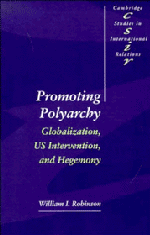Book contents
- Frontmatter
- Contents
- Acknowledgments
- List of acronyms and abbreviations
- Introduction. From East–West to North–South: US intervention in the “new world order”
- 1 From “straight power concepts” to “persuasion” in US foreign policy
- 2 Political operations in US foreign policy
- 3 The Philippines: “Molded in the image of American democracy”
- 4 Chile: Ironing out “a fluke of the political system”
- 5 Nicaragua: From low-intensity warfare to low-intensity democracy
- 6 Haiti: The “practically insolvable problem” of establishing consensual domination
- 7 Conclusions: The future of polyarchy and global society
- Notes
- Select bibliography
- Index
- CAMBRIDGE STUDIES IN INTERNATIONAL RELATIONS
Introduction. From East–West to North–South: US intervention in the “new world order”
Published online by Cambridge University Press: 05 July 2011
- Frontmatter
- Contents
- Acknowledgments
- List of acronyms and abbreviations
- Introduction. From East–West to North–South: US intervention in the “new world order”
- 1 From “straight power concepts” to “persuasion” in US foreign policy
- 2 Political operations in US foreign policy
- 3 The Philippines: “Molded in the image of American democracy”
- 4 Chile: Ironing out “a fluke of the political system”
- 5 Nicaragua: From low-intensity warfare to low-intensity democracy
- 6 Haiti: The “practically insolvable problem” of establishing consensual domination
- 7 Conclusions: The future of polyarchy and global society
- Notes
- Select bibliography
- Index
- CAMBRIDGE STUDIES IN INTERNATIONAL RELATIONS
Summary
In any society the dominant groups are the ones with the most to hide about the way society works. Very often therefore truthful analyses are bound to have a critical ring, to seem like exposures rather than objective statements… For all students of human society sympathy with the victims of historical processes and skepticism about the victors' claims provide essential safeguards against being taken in by the dominant mythology. A scholar who tries to be objective needs these feelings as part of his working equipment.
Barrington Moore“We have 50 percent of the world's wealth, but only 6.3 percent of its population… In this situation we cannot fail to be the object of envy and resentment,” noted George Kennan in 1948. “Our real task in the coming period is to devise a pattern of relationships which will allow us to maintain this position of disparity,” said the then Director of Policy Planning of the Department of State. “We should cease to talk about the raising of the living standards, human rights, and democratization. The day is not far off when we are going to have to deal in straight power concepts. The less we are then hampered by idealistic slogans, the better.”
Kennan's candid statement emphasizes that the strategic objective of US foreign policy during the Cold War was less battling a “communist menace” than defending the tremendous privilege and power this global disparity of wealth brought it as the dominant world power, and suggests that democracy abroad was not a major consideration for the United States in the formative years of the post-World War II order.
- Type
- Chapter
- Information
- Promoting PolyarchyGlobalization, US Intervention, and Hegemony, pp. 1 - 12Publisher: Cambridge University PressPrint publication year: 1996



